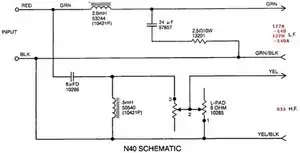
How to JBL L40
These are some common tools used to work on this device. You might not need every tool for every procedure.
The JBL L40 is a speaker system released in the mid-1980s and identified by the model number L40. It was designed as a bookshelf-type system and includes two loudspeakers with a bass-reflex scheme. JBL is an American company that produces audio equipment including loudspeakers and headphones.
The JBL L40 system includes a 25-centimeter diameter 127-Amp woofer attached to the back shell of each speaker. The speakers feature an output sound pressure level of 88 decibels (75 decibels is generally considered a comfortable listening volume). It includes a 10-inch loudspeaker with a 2-inch voice coil and a 2.5-pound magnetic assembly energized by an Alnico V magnet. The L40’s voice coil and magnetic assembly are large in comparison to most other 10-inch loudspeakers of the time, resulting in improved transient response and increased efficiency. JBL recommends using an amplifier of 10 to 60 Watts. The system has a crossover frequency of 1800 Hz and an impedance of 8 ohms.
Most JBL L40 models include a 1- by 25-millimeter bass cone and a 1- by 25-millimeter tweeter dome. The speaker systems were sold in a variety of colors, including brown, rust, or tan, and generally feature an oiled walnut finish. JBL L40 speakers include a stretched fabric grille.
Scheme: 2 ways, 2 loudspeakers bass-reflex scheme, and a bookshelf type
Using unit:
Allowable Input: 35W (succession special NetWare program)
Impedance: 8ohms
Crossover Frequency: 1800Hz
Output sound pressure level: 88dB (new Japanese Industrial Standard)
Dimensions: Width 381x height 584x depth of 302mm
Weight: 20kg (at the time of original packaging)
Manual: L40om.pdf
Spec Sheet:

Crossover Wiring Diagrams:
*

*
